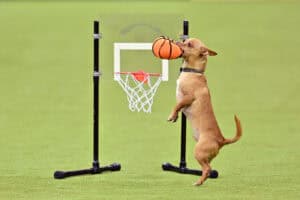Some dogs are genetically hyperactive. Some individuals within certain breeds never stop for a minute to rest. Then, there are many dogs with normal activity levels which are constantly stimulated by people to perform and respond

Most pet owners get a personal thrill when their pets are excited to see them and encourage the behaviour by shrieking a greeting of endearment and inadvertently training the dog to be a jumping, panting and overactive lunatic in the presence of humans. In this negative training programme the dog learns very early on to jump in the desire to make direct eye and mouth contact.
For this purpose a Jack Russell Terrier can jump from ground zero into the owner’s arms or a giant breed stands up on its hindquarters to lick the owner’s face while its forelegs hang over the person’s shoulders. It is well understood by dog trainers, animal behaviourists and the veterinary fraternity that dog owners do this for their own selfish benefit and not for the pet.
Dogs that jump up are not only a nuisance but bad manners for visitors. A large dog can knock over people very easily and cause serious bodily harm. In one case, a grandmother with a walking stick was bumped by the dog which made her fall down a small flight of stairs. She not only suffered a leg fracture but a fat embolus from the bone marrow metastasised to the lung and caused the unnecessary death of the elderly lady.
Dog owners need to think laterally and futuristically about their attitudes towards their companion animals as the pet reflects the state of functionality within the home. Many visitors object to dogs jumping up and getting their claws into their clothing. Others dislike a dog jumping onto their lap and shedding hair on their clothes.
There are numerous factors influencing hyperactivity. Genetics and environment generally encompasses it all. Under the category of environment it includes the influence of the family who may be teasing the pup, creating only highly active games such as chasing, over-exciting the dog at every interaction, patting the dog until it is blue in the face, talking to the dog all the time and even selecting a working breed for a very restricted home environment. The lack of visual and mental stimulation can create such severe levels of anxiety that the dog can run around all day trying to burn up its pent-up energy and frustration.
The answer to this kind of behaviour problem is to train your dog to be calm. This must run parallel with the same purpose and energy to train your family to chill out when in contact with the dog. Besides the liability of a hyperactive dog offending or hurting a third party this type of pet is actually dysfunctional, disobedient and neurotic.
There are several books written about the calming signals of wolf packs which have the purpose of stabilising any insecurity, frustration or inappropriate aggression amongst its members. It is mostly the she-wolf that dispenses the necessary signals in the interest of the pack system. An instinctive disciplinarian qualified by experience. Dog owners need to play a similar role albeit our consistency, timing and discipline is very poor. There are many home methods which may be applied to teach your dog to settle down as prevention or as a cure.
In preparation people must learn to stop vocalising too much and too loudly, to stop petting and staring the dog in the eyes. All these attitudes creates discomfort and a need to respond which is usually adversely. I teach people to hold their dogs in an encompassing gentle hug by wrapping ones arms around the chest and pulling the dog up against you. Very soon the dog will relax and fall asleep because of the confidence conveyed by this form of contact. This can be applied to a dog of any size. It is mutually soothing and as soon as the dog relaxes you reward it in a short whisper.
Read more on calming methods in next Saturday’s Citizen.
Support Local Journalism
Add The Citizen as a Preferred Source on Google and follow us on Google News to see more of our trusted reporting in Google News and Top Stories.








